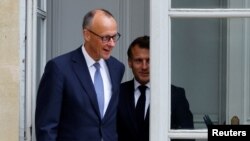Germany's new chancellor, Friedrich Merz, visits Brussels on May 9 for meetings at the European Union and NATO following a whirlwind first few days in office amid a bulging international in-tray.
Expectations are weighing heavily on Merz, who has stepped onto the global stage this week pledging to bring new vigor to both German and European foreign policy.
It's fair to say the new German chancellor got off to an embarrassing start. For the first time ever, the Bundestag had to vote twice to approve him as he fell six MPs short in the first round.
It was not quite the ringing endorsement needed for a leader of the EU's most important country.
How Will Merz Deal With The US?
Arguably the most urgent issue facing Merz is the stormy relationship with an American administration questioning almost every aspect of the liberal world order that German postwar politics of all stripes have clung to for decades.
Merz has to muster a "coalition of the willing" of largely European countries to stand behind Ukraine – and most importantly, stand up to Russian President Vladimir Putin.
And then there are the domestic headaches: kick-starting a German economy that shrunk in both 2023 and 2024 and is projected to be insipid this year, as well, and finding an answer to the populist far-right Alternative for Germany (AfD) that finished second with record numbers in February's general election and is now polling neck-and-neck with Merz's center-right Christian Democrats.
He has already secured changes to the country's rigid debt rules to allow for increased defense spending and the creation of a 500 billion euro spending splurge on infrastructure that Merz hopes will get the economy purring again -- and stave off dissatisfaction that could lead to the Afd becoming even more popular when the next election comes around in four years.
Aiming For A Strong Start With EU Leaders
It does, however, appear that it's in the foreign arena the newly minted chancellor will try to make the strongest early impression.
This week's schedule included Paris, Warsaw, Brussels, and London in a bid to shore up European unity, and Merz is likely to score some early symbolic victories.
Merz is keen to reinvigorate the Germany-France-Poland "Weimar triangle," and in French President Emmanuel Macron and Polish Premier Donald Tusk he has counterparts who are on the same page on most aspects of foreign policy.
They will push for increased European defense spending, more sanctions on Russia, an opening of EU accession talks for Ukraine, and increased military support for Kyiv -- the latter by approving the transfer of German Taurus cruise missiles, something that wasn't politically possible under the previous German government.
On Britain, he will be encouraged by closer political and military cooperation to be signed off on at the first EU-UK summit since Brexit in London on May 19. His choices of the experienced Johann Wadephul as foreign minister and retention of the popular Social Democrat Boris Pistorius as defense minister have reassured partners around the world.
But then there are the tricky customers.
Dealing With Central Europe's Populists
Merz will have to grapple with Central European populists in the shape of the Hungarian and Slovak prime ministers, Viktor Orban and Robert Fico. They have stymied EU responses to support Ukraine politically and financially, and prevented bigger punishments meted out on the Kremlin.
But the biggest challenge will be US President Donald Trump.
On paper, there are numerous things that should make them tick. Both of them have been regarded as "outsiders" with minimal political executive experience before entering the highest office but with plenty of know-how of company boardrooms and lush golf greens.
Merz was also an ardent Atlanticist until recently but was, like many Germans, stung by US Vice President JD Vance's harsh critique of Europe at the Munich Security Conference in February and the treatment of the Ukrainian President Volodymyr Zelenskyy during his White House visit in March.
Directly after his election victory, Merz called for Europe to make itself independent from the United States. More recently, he lashed out at American cabinet ministers and urged them to stay out of German domestic policies. This followed criticism from Washington of the decision by Germany's domestic intelligence agency to classify the AfD as an extremist organization.
But it's the practicalities that matter. And here, he still needs Washington onboard for a bit longer. He will meet the Trump both at the G7 in Canada in mid-June and then at the NATO summit at The Hague later that same month.
The two things Merz will want to ensure is American commitment to the military alliance, including the continued US military presence in Germany.
He also wants to ensure the heavily export-oriented German economy isn't facing sky-high American tariffs that for now are paused until July 8 as Brussels and Washington grapple with a potential trade deal.
Merz simply cannot afford too many more embarrassing mishaps.











